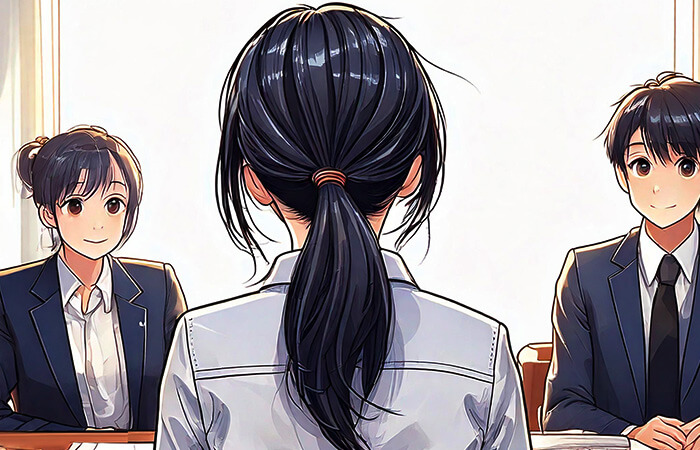Procedures for foreign students to work in Japan
There are several steps that foreign students must take in order to work in Japan.
The following is a general procedure for foreign students to work in Japan.
Part-time work on a student visa
Foreign students studying in Japan can work part-time by obtaining a Permission for Activities Outside the Scope of Their Visa Status. The steps to acquire this permission are as follows.
Application for Permission to Engage in Activity other than that Permitted under the Status of Residence
Obtain the application form for Permission for Activities Outside the Scope of Visa Status and fill in the required details.
Submit it to the nearest Immigration Bureau along with your residence card and passport.
Once the permission is granted, you can work part-time for up to 28 hours per week.
(During school holidays, up to 40 hours per week)

Working as a full-time employee (post-graduation employment)
In order to work as a full-time employee in Japan after graduation, a change of residence status (visa) is required.
You will need to obtain a work visa, such as the "Engineer, Specialist in Humanities, International Services" visa.
- STEP1
Get an official job offer
- Receiving an official job offer from a company is the first step.
- Japanese companies are increasingly hiring foreign students, but the schedule and methods for job hunting should follow the same process as domestic students.
-
It is important to prepare your self-promotion and reasons for applying in Japanese.
Many company interviews are conducted in Japanese.
- STEP2
Residence Status Change Procedure
-
After receiving an offer, you need to work with the company to change your residence status from "student visa" to "work visa".
Required Documents Job offer letter from the employer,
Application for Change of Residence Status,
Passport,
Residence card,
"Employment contract" or "Business plan" provided by the employer. Place of application The nearest Immigration Bureau Review Period Typically 1 to 3 months
- STEP3
Obtaining a Work Visa
- Once the visa is issued, you can officially work in Japan.
- Depending on the type of visa obtained, the specific job roles and activities you can engage in are defined.
Key Points for Job Hunting in Japan
Japanese Language Proficiency
Many companies require business-level Japanese, so passing the JLPT (Japanese Language Proficiency Test) at level N2 or higher will give you an advantage.
Internships
Gaining internship experience while studying can be a strong point to highlight in your job search.
Utilizing the Career Center
Japanese universities have career support centers that provide advice on job hunting and introduce companies.
If You Want to Continue Part-time Work After Graduation
It may be necessary to continue working part-time temporarily after graduation until securing a full-time job. In such cases, it is important to pay attention to visa types and conditions.
After graduation, you can obtain a "Designated Activities Visa (for continued job hunting)" to continue job hunting for a certain period.
- To work part-time during your student years, you must obtain "Permission for Activities Outside the Status of Residence".
- After graduation, to work as a full-time employee, you need to apply for a work visa after finding a job.
- Japanese language skills and internship experience are key factors that will help in progressing your job search.
Work Visa Information
To work in Japan, you must obtain the appropriate work visa (status of residence).
There are various types of work visas depending on the job and duties involved.
The type of visa you apply for is determined based on the occupation and the requirements of the company you wish to work for.
Main Types of Work Visas
Below are examples of typical statuses of residence that can be obtained for work purposes.
| Technology, Humanities, and International Services Visa | |
|---|---|
| Target | Professions such as engineers, IT specialists, interpreters, translators, marketing, accounting, legal, etc. |
| Eligibility | Individuals who have graduated from a university or vocational school, or those who have practical experience relevant to the job. |
| Features | This is the most common work visa, applicable to many industries. It is the most widely used visa for international students who wish to work in Japan after graduation. |
Work Visa Application Procedure
To obtain a work visa, the applicant must cooperate with the company they plan to work for to proceed with the application process.
Having Japanese language skills and practical work experience can help smooth the application process for a work visa.
Particularly for jobs that require Japanese language proficiency, proving the required language level can help expedite the approval process.
Additionally, if you have substantial work experience, submitting a detailed work history and educational background during the application can be beneficial, allowing for a smoother application process.
For detailed application procedures, please refer to Visa and Residence Permit Information.
To obtain a work visa, you must sign an employment contract with a Japanese company, and then proceed with the visa application process.
The type of visa varies depending on the job or business activities, so it is important to follow the correct procedures.
Additionally, Japanese language proficiency and practical work experience can help facilitate the smooth progression of the work visa application.
Recruitment Process

Although the hiring process in Japan varies somewhat by company and industry, the basic flow is the same for many companies.
Below are the steps of a typical recruitment process.
- 01
-
Self-Analysis & Company Research
The first stage of the hiring process is self-analysis and company research. Self-Analysis Clarifying your strengths, weaknesses, interests, and career goals. This will help you identify industries and job types that suit you. Company Research Understanding the industry, business operations, and corporate culture of your desired companies, helping you determine which company is the best fit for you. It is common to use company websites, news articles, and job search websites for research.
- 02
-
Submission of Entry Sheets and Resumes
As an early stage of the hiring process, you will be required to submit entry sheets (ES) and resumes.
These documents are important for companies to understand the candidate's basic information and reasons for applying. Entry Sheet (ES) In Japan's job search process, the ES is very important. Typically, it includes your motivation for applying, self-promotion, and details of things you focused on during your student years (such as "Gakuchika"). Resume A document that includes your educational background, work history, skills, and qualifications. Sometimes a handwritten version is requested, while other times, you may be asked to submit a digital form.
- 03
-
Document Screening
Based on the submitted entry sheets and resumes, companies will conduct a document screening.
In this stage, the applicant's basic information, motivation for applying, and suitability for the company will be assessed. Evaluation Criteria The key points include whether your educational background, skills, self-promotion, and motivation for applying are clear, and whether they align with the qualities the company is looking for in a candidate. Result Notification If you pass the document screening, you will receive a notification to proceed to the next stage.
- 04
-
Written Test & Aptitude Test
After passing the document screening, it is common for written tests and aptitude tests to be conducted.
The content of these tests varies depending on the company, but typically includes the following types: General Knowledge Test Questions testing basic knowledge in subjects like Japanese, mathematics, and social studies. SPI Test A commonly used aptitude test, which includes verbal and non-verbal questions as well as personality assessments. Specialized Knowledge Test For certain industries or professions, there may be tests focused on specialized knowledge relevant to the field.
- 05
-
Interviews (Multiple Rounds)
After passing the written tests and aptitude tests, you will proceed to the interview stage. Typically, several rounds of interviews are conducted depending on the company.
Below are the common types of interviews: First Interview The first interview is usually conducted by relatively junior staff or HR personnel. You will typically be asked about your motivation for applying, self-promotion, and your past experiences. Second Interview After passing the first interview, more detailed questions and discussions about your job suitability will take place. In this stage, the interviewer is often a manager or department head. Final Interview The final interview typically involves executives or the company's top management, such as the president. At this stage, the applicant's personality and fit with the company are assessed.
- 06
-
Job Offer
After passing the final interview, you will receive a job offer from the company.
Here is the typical flow after receiving the offer: Receiving the Job Offer Letter The company will send you a formal offer letter, which includes details about the salary, employment terms, and start date. Accepting the Job Offer You will decide whether to accept the job offer. If you are considering other companies, take time to carefully evaluate and make your decision.
- 07
-
Preparation for Joining the Company
Once you accept the job offer, you will need to submit the required documents to the company and participate in orientations or training sessions as part of the preparation for joining.
For new graduates, many companies offer training sessions over a few months before the official start date.
- 08
-
Post-Hire Follow-Up
Some companies may offer training or events during the period between the job offer and joining.
Additionally, there may be opportunities for interactions among new hires or events designed to deepen understanding of the company culture.



